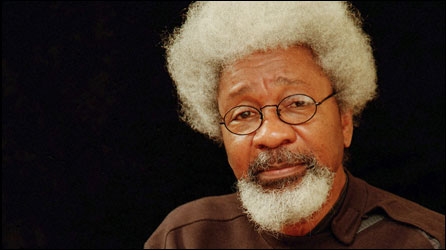Nobel laureate Prof Wole Soyinka has condemned what he called sustained contempt of the judiciary by security agencies and political office holders. He said it is an aberration in a democratic setting for people to disobey orders of the court. It is the surest way to anarchy, the literary icon said.
The playwright, who cited no specific instance, said only criminals would flout court orders in a democratic society. He made a reference to Ekiti State Governor Ayodele Fayose, who the literary giant described as a “thug”.
Soyinka made the remarks in a keynote address titled: A taskmaster named curiosity at the 10th Wole Soyinka Award for Investigative Reporting, where media practitioners from print, online and electronic platforms were rewarded for their investigative works. The event was held on Wednesday at MUSON Centre, Onikan, Lagos Island.
The literary giant also called for an end to unlawful detention, which he described as unacceptable in a democracy. He said no matter the offence an individual may have committed, security agencies must respect the order of the court once the accused has been granted bail.
Soyinka said: “If a court grants an individual bail, I don’t care what crime the individual is accused of. There are many avenues for security agencies to pursue their quest without flouting the orders of the court. It is wrong, and we dare not continue to keep silent when one of us – a citizen of this nation, whether militarised or civilianised – is granted bail by the court and some excuse is given for flouting the order of the court.
“Those who do that (flout court orders) are behaving exactly like Fayose, that thug in Ekiti, who went to court, beating the judges, tore their clothes and got away with it. I see no difference between Fayose and any police agency or person that flouts court orders or treating court in contempt.
“That is the only arbitration avenue that belongs to all of us. We have a duty to protect the court and we must put an end to this contempt of the orders of the court by any government.”
The playwright said there were alternative avenues, which security agencies could explore to make accused persons accountable for their sins without flouting court orders.
He also condemned what he described as daily assaults on civilian population by soldiers, observing that human rights abuse has continued to mar the nation’s democratic system.
According to him, every reasonable person should be concerned about the ceaseless assaults on civilians by military personnel, calling for a halt to human rights abuses by security agencies.
He called for an to abuse of defenseless civilians, accusing soldiers are behaving like Boko Haram in dealing with civilians. Noting that people had suffered enough during the dark days of military rule, Soyinka challenged President Muhammadu Buhari to check the excesses of soldiers.
He described the unending human rights abuses being perpetrated by the military as internal warfare on the people.
His words: “I am challenging President Buhari to put an end to this internal warfare, which for some reasons or the other, has been declared by the military against the populace. If you want us to go out, the populace must be moblised against the military through any means to make them understand they are fighting a war; a war has been declared against us – the humanity.
“I don’t consider the military as an enemy, but the military has some rotten eggs, some killers, some insensitive individuals. I think after these years of military rules, there should be a permanent terminus to military assaults on the populace. We want this ended and we want the results on time.”
The Nobel laureate said it was regrettable that no soldier had been punished for assaults on civilians, noting that recommendations of commissions of inquiry set up by government to probe series of military abuse of citizen’s rights were usually not made public.
Soyinka said any soldier, who committed infraction against civilians must be punished by court, dismissing military’s internal penance method.
Speaking on mass failure in School Leaving Certificate Examinations, the professor of Literature said pupils should not be blamed for the mass failure. Teachers, he said, should be blamed for the problem, saying the pupils only wrote what they were taught by their instructors. He made an appeal to the media to write on the quality of education being taught in schools.
He said: “When our students take common examination with other countries and they fail in English, you blame them. But, when the teachers don’t even know what is correct, and the editors don’t even know what is right, and the journalists don’t know what is correct, and even former Heads of State don’t know what is correct…you blame the children for their failure in a particular subject.
“We are not talking about English now; we are talking about use of language. If you are going to use a language, even if it is a sign language, you have to use it correctly so that you don’t communicate wrongly. There are consequences. International examiners are not going to say, ‘that is Nigerian English’. They are not Nigerians and all they understand is English.
“When you teach school children that ‘severally’ means ‘several times’, you are talking nonsense. Please, tell our teachers, don’t teach children nonsense. I have said it, you can’t call an individual severally; it is several times. Could you please assist me, so that my blood pressure can go down completely. I am begging you.”
The writer, who described investigative journalism as a dangerous brand of the media profession, said there was no other time the nation needed that brand of journalism than now. He commended the awardees for suppressing frustrations to exhume truth in diverse areas of human activities.
The Nation

